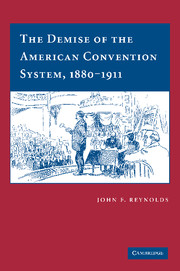Book contents
- Frontmatter
- Contents
- Acknowledgments
- Abbreviations
- The Demise of the American Convention System, 1880–1911
- 1 Introduction
- 2 The Search for Harmony: The Convention System in the Party Period
- 3 The Emergence of the Hustling Candidate
- 4 Coping with Competition: The Limitations of Party Self-Regulation
- 5 “The Pivot of Reform”: Debating the Direct Primary
- 6 The Direct Primary in the Reform Tradition
- Appendixes
- Bibliography
- Index
4 - Coping with Competition: The Limitations of Party Self-Regulation
Published online by Cambridge University Press: 18 August 2009
- Frontmatter
- Contents
- Acknowledgments
- Abbreviations
- The Demise of the American Convention System, 1880–1911
- 1 Introduction
- 2 The Search for Harmony: The Convention System in the Party Period
- 3 The Emergence of the Hustling Candidate
- 4 Coping with Competition: The Limitations of Party Self-Regulation
- 5 “The Pivot of Reform”: Debating the Direct Primary
- 6 The Direct Primary in the Reform Tradition
- Appendixes
- Bibliography
- Index
Summary
As the twice-elected chief executive of New Jersey's largest city, James M. Seymour was an obvious choice for governor in 1898. The Newark mayor never formally announced his candidacy for the Democratic nomination, but did admit that were it tendered him, “he would consider himself … constrained to accept.” Seymour needed a friendly delegation from his home county of Essex to the state convention to make his candidacy viable. The mayor's friends mounted a well-organized effort to carry the primaries, outdoing anything attempted by any previous gubernatorial aspirant. They had to be more aggressive because of the hostility of the local Democratic organization. Seymour's patronage practices had alienated many the party's leaders, a common source of strife that ended many an incumbent's political career. The turmoil that engulfed the ensuing primary revealed the deficiencies of the party-administered indirect primary when faced with a highly visible and contentious struggle for party supremacy.
Ostensibly, the Newark mayor's candidacy appeared formidable. His opponent, Elvin W. Crane, was an obscure politician who had served two terms in the state assembly a decade earlier. “[O]n his merits and popularity Mr. Crane would never have had a ghost of a chance of being nominated for governor,” the Newark Evening News editorialized.
- Type
- Chapter
- Information
- The Demise of the American Convention System, 1880–1911 , pp. 105 - 157Publisher: Cambridge University PressPrint publication year: 2006



